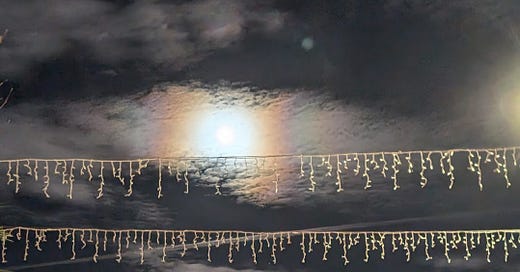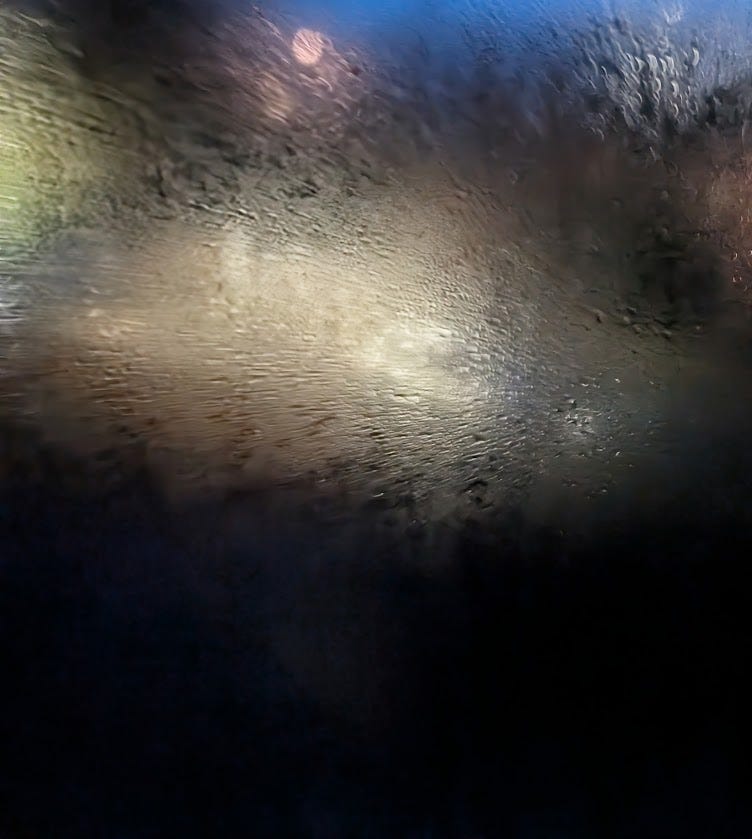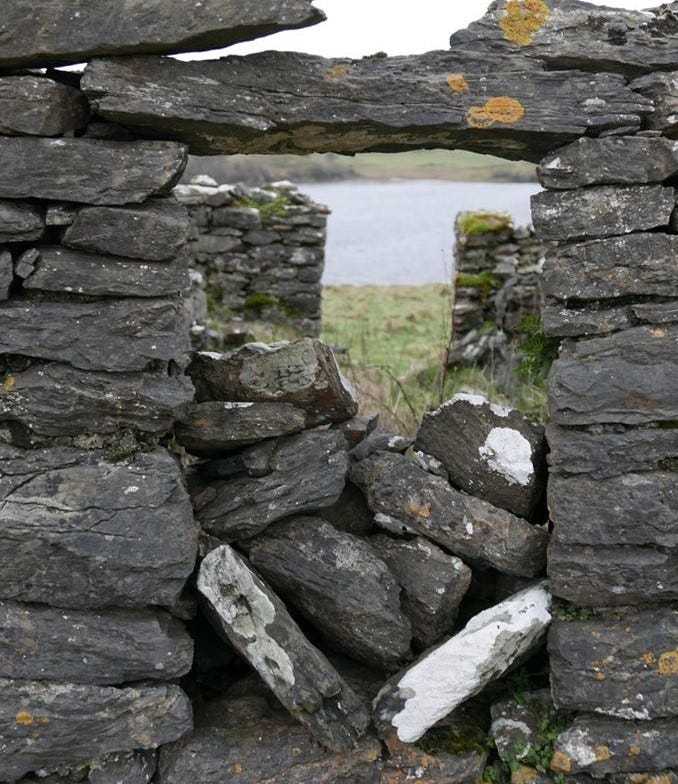Keywords are formative. They bring us our first questions and understandings, even as we add/mix later ones. Along the way to getting lost in that good David Lynchian manner, keywords are stepping stones across swirling waters.[1] So, I pause for ‘working definitions’ of archive - noun and verb.
Merriam-Webster, for example, provides the following:
archive (noun): a place in which public records or historical materials (such as documents) are preserved (an archive of historical manuscripts; a film archive).
Also: the material preserved, often used in the plural (reading through the archives)
archive (verb) archived; archiving: to file or collect in or as if in an archive (archive documents; archived tissue samples)
Next, I turn to a Dictionary of Etymology:
archive (noun): see archives
Somewhat surprised, I follow the instruction to depart pronto from archive and make my way to archives:
archives (noun):
c. 1600, "records or documents preserved as evidence," from French archif (16c., Modern French archives), from Late Latin archivum (plural archiva) "written records," also the place where they are kept, from Greek ta arkheia "public records," plural of arkheion "town hall, public building," from arkhē "government," literally "beginning, origin, first place" (verbal noun of arkhein "to be the first;" see archon). The sense of "place where public records and historical documents are kept" in English is from 1640s.
archive (verb): to file or enter into an archive collection, 1819 (implied in archived), from archives. Related: archiving.[2]
The Dictionary of Etymology shows us the early links (in Latin and Greek) between archive (noun) as records/documents/collections and archive as place. The verb form – archiving as practice – is shown to arrive centuries later.
We are left with two critical opening questions. First, why - in the noun form - is the crossing from archive to archives made so easy? We are sent to the land of the plural without explanation or delay. There is no clear answer other than that we are – in this move from singular to plural - encouraged to limit our ideas about the archive to its materiality. The plural form serves to remind us that we are talking about collections in dedicated locations, in buildings, libraries, or more lately (if impalpably) in digitized collections online. We believe in archives, in their existence. We long to go to them, seek entry, ask for documents, find something that was previously lost, answer a nagging question that has delayed the completion of an essay, locate evidence, and formulate our ideas about past events and people.
My second question applies to both the current and etymological entries. Why – in the verb form – is archiving defined narrowly as the filing/entering of evidence into an institutionalized archive? Does such a narrow definition not omit a multiplicity of actions in official archives, outside of them, against them, and in numerous other interactive spaces? Again, no clear answers. But surely missing here is a more fluid idea of archiving as art, identity, and practice, something that captures the continuous movement/exchanges in all directions between archive(s), archivists, and the rest of us, the seekers of times past, seekers/creators of ourselves, and the present too.[3]
Please don’t get me wrong. Despite these questions, there are few greater gifts than hours spent in archives. I recall my first encounter with a collection of primary-source documents - in this instance, 19th-century London court records examined for an undergraduate essay on class relations and domestic violence in Victorian England. There was a thrill, a conviction that finally, I was doing the thing called History. So yes, the land of the plural and the material locations of archives –are important. We journey to the archives because they are the yellow brick road of the historian’s quest. They underscore incontrovertible facts – the date of the Emancipation Proclamation, for example, January 1st, 1863. Yet, and let’s say it emphatically: yet, the Proclamation cannot be examined without its inextricable link to another date, June 19, 1865 (Juneteenth), and the larger history of slavery and race, the Civil War, Jim Crow, and the unfinished pursuit of racial justice in the United States. All of these require further evidence, some of it from archives, some from oral histories and secondary sources (the realm of historiography and historians’ debates) where we find contested readings of our American story.
In other words, there always was and will be something outside the archives and beyond our innocent faith in them. There is a politics of the archive, specifically, how particular inclusions, exclusions, erasures, and differing curations were brought about. Who benefitted from the decisions concerning any given set of historical records? Questions that must be continually revisited. Who is speaking now? Who controls the archives now?[4] So, no, there will be few arguments about the bare facts and dates of the Proclamation, but there will be necessary debates about the historical context, what preceded and followed, the availability of evidence and interpretations surrounding it, and the Proclamation’s lasting meaning and importance.[5]
To return to my undergraduate essay on domestic violence, the archives provided evidence of the number of cases during a selected period that had something to do with domestic violence, including case outcomes, judges’ remarks, and sentences. In related archives, I found newspaper articles, hospital records, and a handful of letters. But of course, this green historian had to learn quickly that the term at the center of my project - ‘domestic violence’- only achieved currency in the 1970s. How the issue was viewed at the time of those court records differed radically from the view I had gained by working in a London refuge for women fleeing what we all agreed was, without question, domestic violence. If there was continuity, it resided in the fact that as late as the 20th century, the time I wrote my essay, we were still fighting persistent notions regarding domestic privacy – that the home was a ‘man’s castle’ in which he might do what he wished. We could still recall societal beliefs that a husband might physically ‘chastise’ his wife provided he used a stick no bigger than his thumb.[6] But such continuity, however important, was not the topic of my modest essay. The assignment was to test my usage of primary sources, not my 20th-century feminist commitment to overturning patriarchy and male violence. It would be, for me, later and no less critically, to integrate these parts of my historian-self. And this, perhaps, brings us back to the definition of archives.
My larger concern is that the dictionaries, like guards at a border crossing, marshal us too swiftly. See Archives, we’re told, where we have all you need to know. By all means, we must go, but we will not find all we need to know there. If, in the definitions cited above, there is one phrase to delay this far-too-easy crossing, it is this: "beginning, origin, first place" (verbal noun of arkhein "to be the first;" see archon). Here noun and verb are brought into greater dialogue, and here too, we are reminded that archiving is a search for something lost – a sense of our beginnings, what came before us, and what it meant. Archiving (verb) is – what the dictionaries won’t tell us – a ruminative, artistic, and poignant practice. And ‘the archive’ (noun) is a conceptual and emotive problem as well as a place or collection.
Our lexical border guard has failed to mention that a good deal of theoretical attention has been paid to the archive, particularly since the 1995 publication of Jacques Derrida’s Archive Fever.[7] But urgent questions were always there, emerging at particular key moments in the history of History. They can be found in Jules Michelet, who described his time in the Archives Nationales of Paris as breathing the dust of the dead:
“… as I breathed their dust, I saw them rise up. They rose from the sepulchre… as in the Last Judgement of Michelangelo or in the Dance of Death. This frenzied dance… I have tried to reproduce in [my] work.” [8]
They were a formative element of E.P. Thompson’s The Making of the English Working Class and the concerns of social and oral historians. In his Preface, Thompson wrote:
“Only the successful…are remembered. The blind alleys, the lost causes, and the losers themselves are forgotten. I am seeking to rescue the poor stockinger, the Luddite cropper, the ‘obsolete’ hand-loom weaver, the ‘utopian’ artisan, and even the deluded follower of Joanna Southcott, from the enormous condescension of posterity. Their crafts and traditions may have been dying. Their hostility to the new industrialism may have been backward-looking. Their communitarian ideals may have been fantasies. Their insurrectionary conspiracies may have been foolhardy. But they lived through these times of acute social disturbance, and we did not.”[9]
The postmodern turn in the Humanities and Social Sciences soon disturbed and extended our thinking about archives – their creators, creations, and uses. During ongoing debates about History and postmodernism, Terry Cook argued that the archival document must now be analyzed
“in the context of its time and place, to reveal the underlying mind, motivations, and power structures… of the records creator… With the constant need to re-evaluate, de-construct, and accept the evolution of archival theory and practice, archivists in the new century should accept rather than deny their own historicity, that is, their own participation in the historical process.”[10]
Finally, and perhaps most prophetically, we have the timeless archival meditations of Walter Benjamin - flâneur, urbanist, creator of Surrealist montage, and disobedient collector of texts, images, maps, postcards, fragments, ideas, and quotations. Benjamin viewed collecting as a “form of practical memory” (Arcades Project), of walking and rag-picking, rescuing debris that institutional archives might ignore or discard, theorizing history and modernity, pointing out that the collector seeks to renew the old to examine not only one’s archival finds and treasures but oneself and the present:
“And the man who merely makes an inventory of his findings, while failing to establish the exact location of where in today’s ground the ancient treasures have been stored up, cheats himself of the richest prize… Epic and rhapsodic in the strictest sense, genuine memory must therefore yield an image of the person who remembers.”[11]
Having once described the “struggle against dispersion” as the “most deeply hidden motive of the person who collects,” Benjamin was forced to leave Germany in 1933.[12] But only the year before, he wrote Berlin Chronicle. A Berlin Childhood around 1900 was started in 1932 and revised in 1938. Both works remained unpublished in his lifetime.[13] By 1940, as a German Jew in Vichy France, Benjamin was in extreme danger and possessed no exit visa. Having crossed the Pyrenees hoping to enter Spain as a refugee but turned back at the border, he took his life on September 26, 1940.
As Graeme Gilloch suggests in his eloquent study of Benjamin’s life and work, it is difficult to separate the Berlin writings from the historical situation in which they were written, his exile and eventual suicide:
“Composed in the early 1930s, the Berlin studies were written just as the Nazi terror began to make life in the German capital impossible for him. They are composed from the precarious position of the prospective refugee rather than the comfortable vantage point of the native. Benjamin’s texts recover his childhood experiences of Berlin at precisely the moment when he is compelled to bid the city a forlorn, final farewell.
“Berlin Chronicle and A Berlin Childhood around 1900 are thus far more than mere autobiographical exercises. They are fragile constellations constituted at a specific historical moment: when the ‘at first sight’ of the child intersects with the ‘at last sight’ of the imminent exile. They are Benjamin’s Tableaux berlinoises, precious pictures of places past and places passed, written by the leave-taker with the urgency and intensity, the heartache and hopelessness, of ‘love at last sight’."[14]
If there is a thinker to remind us that archival practices can possess both autobiographical and political urgency in (and for) the present, then Benjamin is that person. And Benjamin’s contributions have rarely felt more relevant than they do today.[15] Indeed, it is arguable that every historian must now defend the archive as an idea and a network of endangered material and digital locations. How archive theory works together with the material fact/practices of archives (real places with real collections of historical evidence) remains forever fraught and unresolved. But the theory and the collections - archive the singular and archives the plural – are lands/differences that every historian visits.
And of course, such advice is not only for historians. It is for all of us because we are in the business, every day, of creating our archives and narratives.
[1] See the Introduction, Lost. “It’s a really beautiful thing how lost we are, and we want to get even more lost sometimes.” David Lynch (Kite, B. “Remain in Light: Mulholland Dr and the Cosmogony of David Lynch,” Sight and Sound, March 2012)
[2] See archive | Search Online Etymology Dictionary (etymonline.com).
[3] See Barbara Steveni’s I AM AN ARCHIVE (IAAA), a performative project tracing her own work and collaborations alongside an exploration of “the role of the archive in current artistic practice.” For an account of Steveni’s art, ideas, and work, see I AM AN ARCHIVE.
[4] At the time of writing, these questions have taken on an unprecedented urgency in the U.S. See, for example, Kellie Carter Jackson, “Trump will not stop until every American relic reflects his imaginary world view,” The Guardian, April 1, 2025. See also Romancing the Archive: The Personal and the Political in this section.
[5] See, for example, the National Education Association (NEA) guide to teachers on this topic: Teaching Juneteenth and the Meaning of Freedom | NEA
[6] It has been claimed, incorrectly, that this is the origin of the term ‘rule of thumb,’ a 17th-century phrase describing a way of obtaining a rough unit of measure and not initially used in the context of domestic violence. But it is also the case that early jurists, newspaper editors, and feminist campaigners drew on the term in relation to domestic violence.
[7] See the next post (coming soon), Archive as Metaphor. (Derrida, Jacques. 1996. ARCHIVE FEVER : A Freudian Impression. S.L.: Univ Of Chicago Press. Archive Fever began as a three-hour lecture given on 5 June 1994 in London during a conference entitled Memory: The Question of Archives. The conference was held under the auspices of the Societe Internationale d'Histoire de la Psychiatrie et de la Psychanalyse, the Freud Museum, and the Courtauld Institute ofArt. The initial title of Derrida’s lecture was "The Concept of the Archive: A Freudian Impression." The French title is "Mal d' archive: Une impression freudienne.")
[8] Jules Michelet, “Preface de l’Histoire de France” (1869), cited in Steedman, Carolyn. 2001. Dust. Manchester: Manchester University Press. 27. In her illuminating treatment of archive theory and historiography, Steedman pointed out that Michelet had truly exposed himself to dust: “the dust of the workers who made the papers and parchments; the dust of the animals who provided the skins for their leather bindings. He inhaled the by-product of all the filthy trades that have, by circuitous routes, deposited their end-products in the archives.” Ibid. 27.
[9] E.P. Thompson, The Making of the English Working Class, Penguin Modern Classics, 2013. 12.
[10] Terry Cook, “Archival science and postmodernism: new formulations for old concepts,” Archival Science 1: 3-24, 2001. 16. See also,
[11] Walter Benjamin, Selected Writings Vol.2, Marcus Bullock, Michael Jennings et al eds. Belknap Press of Harvard UP. (2005) 576.
[12] See Walter Benjamin’s monumental, unfinished work on the Paris Arcades: The Arcades Project, trans. Howard Eiland and Kevin McLaughlin, Belknap Press of Harvard UP (1999) 211.
[13] See Benjamin, Berlin Childhood Around 1900, trans. Howard Eiland, Harvard UP, 2006. And Benjamin, The “Berlin Chronicle” Notices, Publications Studio, 2011.
[14] Graeme Gilloch, Walter Benjamin: Critical Constellations, Polity (2002) 223.
[15] See also, Ursula Marx, Gudrun Schwarz, Michael Schwarz, and Erdmut Wizisla eds. Walter Benjamin’s Archive: Images, Tests, Signs, Verso (2015).






